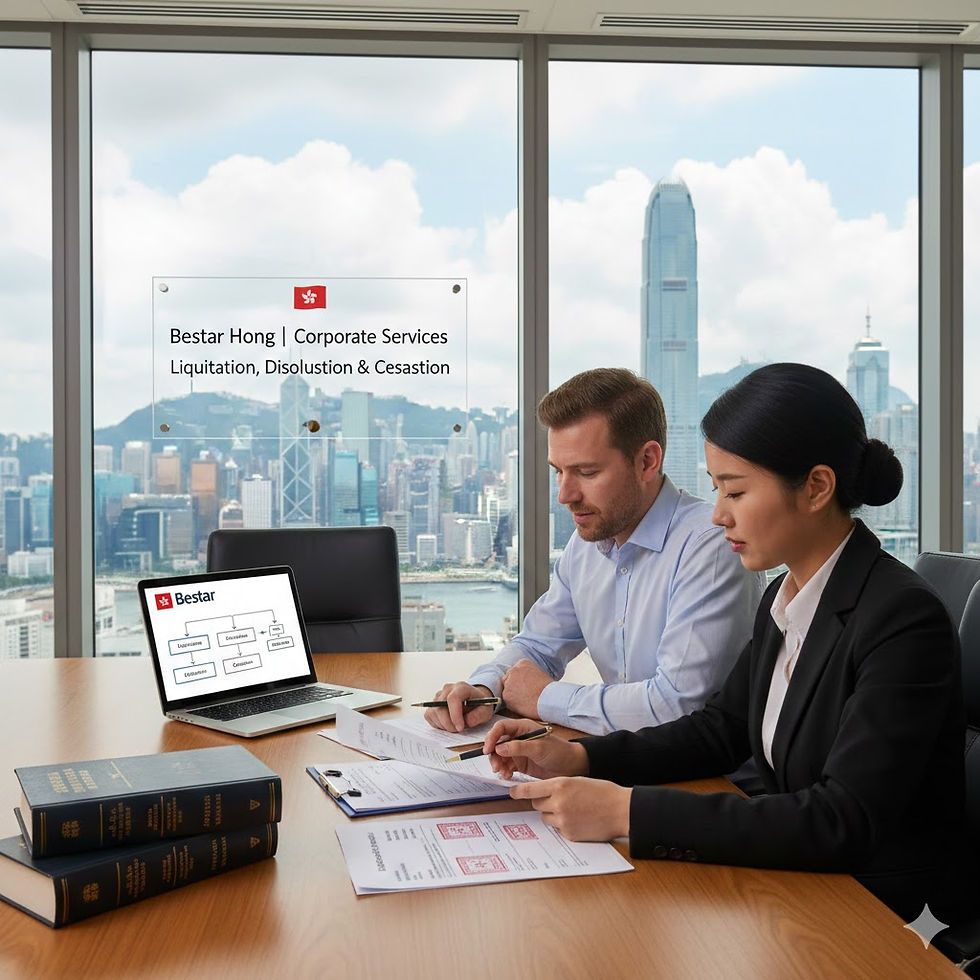Asset Purchase or Share Purchase Hong Kong
- a22162
- May 23, 2024
- 4 min read

Asset Purchase
In an asset purchase agreement in Hong Kong, here's a breakdown of key aspects:
Benefits:
Selectivity: You, as the buyer, have more control. You can choose the specific assets (property, equipment, intellectual property) and liabilities you want to acquire, leaving behind unwanted ones.
Reduced Risk: By carefully selecting liabilities, you can potentially mitigate the risk of inheriting unknown debts or obligations from the seller.
Tax Advantages: Depending on the nature of the assets, there might be tax benefits for you or the seller.
Considerations:
Complexity: Compared to a share purchase, this process is more intricate. Each asset and liability needs to be identified, valued, and transferred individually, requiring more documentation and negotiations.
Business Disruption: Existing contracts tied to the assets may need to be renegotiated or assigned, potentially causing some disruption to ongoing business operations.
Transfer of Liabilities: Following proper procedures under the Transfer of Businesses (Protection of Creditors) Ordinance is crucial to avoid being held liable for the seller's debts arising from the transferred business.
Employee Considerations: There's no automatic transfer of employees under Hong Kong law. You'll need to obtain their consent to be employed by your company, and consider how their employment terms will be handled.
Taxes:
Stamp duty may apply depending on the type of assets being transferred. For instance, there's a higher stamp duty for real estate compared to other assets.
The seller might be liable for capital gains tax on the disposal of the assets.
Recommendation:
Consulting a Hong Kong M&A accountant is crucial. They can guide you through the legal and tax complexities, ensuring a smooth and compliant transaction. They can also help draft the asset purchase agreement and navigate potential challenges.
Share Purchase
Here's a look at share purchases in Hong Kong:
Advantages:
Simplicity: Acquiring all the shares of a company is a more straightforward process compared to an asset purchase. The buyer automatically assumes ownership of all the company's assets, liabilities, and obligations.
Continuity: Existing contracts, licenses, and employee arrangements typically remain valid, ensuring minimal disruption to the business. This can be crucial for maintaining ongoing operations and client relationships.
Clean Break for Seller: The seller disposes of the entire company and its liabilities in one go.
Disadvantages:
Hidden Liabilities: The buyer inherits all the company's liabilities, both known and unknown. This can be risky if there are undisclosed debts or contingent liabilities.
Stamp Duty: Both buyer and seller are typically liable for stamp duty on the share transfer. The exact amount depends on the value of the shares being purchased.
Process:
Signing a Share Purchase Agreement (SPA) outlining the terms and conditions of the acquisition.
Completing due diligence to assess the company's financial health and potential liabilities.
Obtaining necessary approvals (e.g., shareholder approval)
Transferring the shares through a stock exchange or privately.
Updating the company register with the new owner information.
Additional factors to consider:
Pre-emption Rights: Some companies have articles that grant existing shareholders the right to buy offered shares before they are sold to outsiders.
Bulk Acquisitions: If you're acquiring a controlling stake (typically over 30% of shares), additional regulatory filings or takeover offers might be required.
Recommendation:
For a smooth share purchase transaction, consulting a Hong Kong accountant is advisable. They can help you with:
Negotiating the SPA
Conducting due diligence
Ensuring compliance with Hong Kong regulations
Completing the share transfer process efficiently
By involving an accountant, you can minimize potential risks and ensure a successful acquisition.
Asset Purchase or Share Purchase Hong Kong
When deciding between an asset purchase or share purchase in Hong Kong, there are key factors to consider:
Share Purchase:
Simpler process: Acquiring all the shares of a company means the buyer automatically assumes all its assets, liabilities, and obligations.
Continuity for business: Existing contracts and licenses remain valid, ensuring smoother business operations for the buyer.
Clean break for seller: The seller disposes of the entire company and its liabilities.
Drawbacks:
Buyer takes on all liabilities: This can be risky if the target company has unknown debts or contingent liabilities.
Stamp duty: Both buyer and seller typically pay stamp duty on the share transfer.
Asset Purchase:
Selective acquisition: The buyer picks which specific assets and liabilities to acquire, offering more control.
Potential tax benefits: Depending on the asset mix, there might be tax advantages for the buyer or seller.
Drawbacks:
More complex process: Each asset and liability needs to be identified and transferred individually, leading to a more intricate transaction.
Disruption for business: Existing contracts may need to be renegotiated, potentially causing disruption for the ongoing business.
Common choice in Hong Kong:
Share purchases are generally more common in Hong Kong due to their relative simplicity. However, the best choice depends on the specific circumstances of the deal.
Recommendation:
For a nuanced decision tailored to your situation, consulting a Hong Kong M&A accountant is highly recommended. They can advise you on the legal and tax implications of each approach and help you structure the transaction to achieve your objectives.
How Bestar can Help
Based on the information we discussed about asset purchases and share purchases in Hong Kong, here's how Bestar is able to assist you:
For Share Purchases:
Due Diligence Assistance: Bestar's accounting expertise can be valuable during due diligence. We can review the target company's financial statements, identify potential liabilities, and assess its overall financial health. This helps you make informed decisions about the acquisition.
Compliance with Reporting Requirements: We can ensure the share purchase agreement adheres to Hong Kong's legal and accounting standards.
Tax Implications: Bestar might be able to advise on potential tax implications for both the buyer and seller arising from the share purchase.
For Asset Purchases:
Valuation of Assets: Our accounting background can be helpful in valuing the assets you intend to acquire, ensuring you get a fair deal.
Transfer Agreement: We can assist in drafting the asset purchase agreement, outlining the specific assets and liabilities being transferred.
General Assistance:
Regardless of the chosen method (share or asset purchase), Bestar can help navigate the overall process. This includes understanding the legal and regulatory requirements, completing necessary filings, and ensuring a smooth transaction.
Bestar is be a point for acquiring general information and basic support for your acquisition in Hong Kong.



Comments